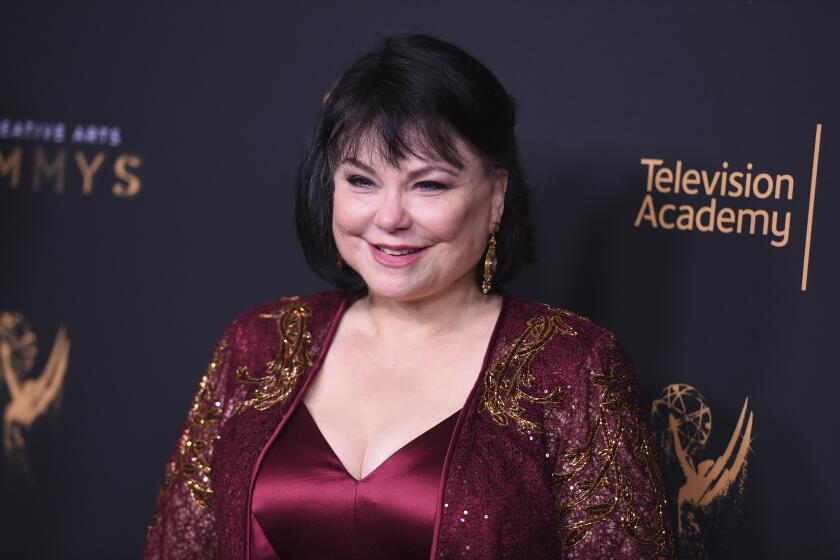Levinson delves into celebs’ politics
Barry Levinson is best known for the critically acclaimed features he directed in the 1980s, including “Diner,” “Good Morning, Vietnam” and the Oscar-winning “Rain Man.” But recently he’s turned his attention to documentaries and smaller projects. At 7:30 tonight, Showtime will premiere “Poliwood,” in which the director followed such celebrities as Anne Hathaway and Ellen Burstyn as they attended political events on the eve of President Obama’s inaugural. Levinson, 67, spoke by phone from his home in Connecticut.
You call “Poliwood” a “film essay.” Why?
I say that because I think of a documentary as, you look into something and you show the ultimate view of something. You’ve investigated something. In this case, I don’t think I can look at it that way. I can only muse on my thoughts and what I’ve seen.
How’s it different making a documentary than a feature?
With a documentary, you have a certain amount of discovery. People will say things you never expected. You may “discover” moments in a film, but you do have a script. So it’s a different process.
Do you consider yourself a political person?
Not in regards to my political position. I think it’s the process that I’m fascinated with, more than I am with wanting to do something for a certain political position. The ideology was not what I was looking to get into here.
If that’s the case, then why in one scene are you wearing a cap with an Obama logo?
Several people have said, “Wow, therefore it shows. . . . “ I was at the inaugural weekend! That’s the president of the United States. Everyone was wearing something. It’s probably, in today’s world, a mistake to have the hat on. But I actually had it on because it was freezing cold. I got the hat from one of the vendors on the street.
You could always have covered the logo.
I’d have to turn it inside out. You can’t cover it up. I could digitally, I guess, try to do it, if possible.
If you were at the George Bush inaugural, would you have worn a George Bush hat?
Well, if it were equally as cold.
Do you consider yourself an Obama supporter?
Of the two candidates, absolutely. I don’t go out, necessarily, to campaign for somebody. But you have to look at who’s running. Of the two people running, I would clearly favor Obama over [Sen. John] McCain.
In the film, you spend a lot of time looking at how prominent actors try to influence politics. Can celebrities really play an effective role in the debate?
I think they can be effective in shining a light on certain things we’re not paying attention to. I don’t believe we will select a candidate based on what any celebrity does.
You show a group of celebrities, including “Glory Road” star Josh Lucas, becoming very defensive when GOP strategist Frank Luntz tells them that sometimes celebs seem more interested in telling people how they feel than they are in successfully arguing a point.
I was looking at the standpoint of human behavior. Sometimes, with the very best intentions, we don’t necessarily hear what’s being said. That to me is interesting, because Josh is very smart. Luntz is a Republican strategist, so maybe there’s an element to it where we misinterpret what was being said.
Would those celebrities have had the same reaction if the speaker had been a Democratic strategist?
Probably not.
You talk about money in the system, so how come the film doesn’t delve more deeply into the issue of political advertising, which seems the No. 1 reason why campaigns are so expensive?
Mainly because it becomes another issue. I don’t pretend I could possibly cover all of this subject. So all I can do is cover parts of it. And it’s sort of alluded to. But I don’t get into it more deeply because it’s such a huge subject of its own.
How do you feel personally about political ads?
I think there shouldn’t be any. I think you have to take them completely off the board. You can’t have any of that anymore. We’re eliminating an awful lot of qualified people who can’t even get into the arena because the money is so prohibitive.
You say in the film that “we’re living in absurdist times.” Really? More absurdist than the McCarthy era?
Yes. Because the McCarthy era was an absurdist time in one particular area. Now, everything is absurd. We can’t accomplish anything. Everything has become an issue of polarization.
Well, despite all the noise, healthcare reform may actually pass, right?
It may. Some part of it. It may pass, but what I’m saying is, it won’t pass with any sense of cooperating to find the best possible conclusion.
President Obama promised to bring bipartisanship to Washington. How do you think he’s done?
Well, I think he tried. He probably found out that you can’t. There is no such thing in the times that we’re in, to have any kind of bipartisanship. It doesn’t seem to exist. I don’t know if it’s possible.
--
The complete guide to home viewing
Get Screen Gab for everything about the TV shows and streaming movies everyone’s talking about.
You may occasionally receive promotional content from the Los Angeles Times.




